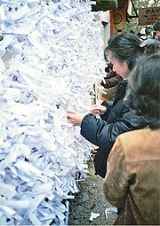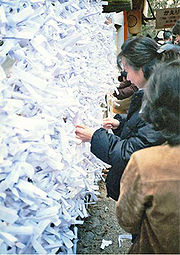
Omikuji
Encyclopedia

Prophecy
Prophecy is a process in which one or more messages that have been communicated to a prophet are then communicated to others. Such messages typically involve divine inspiration, interpretation, or revelation of conditioned events to come as well as testimonies or repeated revelations that the...
s written on strips of paper at Shinto
Shinto
or Shintoism, also kami-no-michi, is the indigenous spirituality of Japan and the Japanese people. It is a set of practices, to be carried out diligently, to establish a connection between present day Japan and its ancient past. Shinto practices were first recorded and codified in the written...
shrines and Buddhist temples in Japan
Japan
Japan is an island nation in East Asia. Located in the Pacific Ocean, it lies to the east of the Sea of Japan, China, North Korea, South Korea and Russia, stretching from the Sea of Okhotsk in the north to the East China Sea and Taiwan in the south...
. Literally "sacred lot
Lot
Lot or lots may refer to:*Lot , a unit of weight used in many European countries since Middle Ages until the beginning of the 20th century*Lot, a set of goods, together for sale in an auction; or a quantity of a financial instrument...
", these are usually received by making a small offering (generally a five-yen coin as it is considered good luck) and randomly choosing one from a box, hoping for the resulting fortune to be good. ( coin-slot machines sometimes dispense omikuji.)
The omikuji is scrolled up or folded, and unrolling the piece of paper reveals the fortune written on it. It includes a general blessing which can be any one of the following:
- Great blessing (dai-kichi, 大吉)
- Middle blessing (chū-kichi, 中吉)
- Small blessing (shō-kichi, 小吉)
- Blessing (kichi, 吉)
- Half-blessing (han-kichi, 半吉)
- Future blessing (sue-kichi, 末吉)
- Future small blessing (sue-shō-kichi, 末小吉)
- Curse (kyō, 凶)
- Small curse (shō-kyō, 小凶)
- Half-curse (han-kyō, 半凶)
- Future curse (sue-kyō, 末凶)
- Great curse (dai-kyō, 大凶)
It then lists fortunes regarding specific aspects of one's life, which may include any number of the following among other possible combinations:
- 方角 (hogaku) - auspicious/inauspicious directions (see feng shuiFeng shuiFeng shui ' is a Chinese system of geomancy believed to use the laws of both Heaven and Earth to help one improve life by receiving positive qi. The original designation for the discipline is Kan Yu ....
) - 願事 (negaigoto) – one's wish or desire
- 待人 (machibito) – a person being waited for
- 失せ物 (usemono) – lost article(s)
- 旅立ち (tabidachi) – travel
- 商い (akinai) – business dealings
- 學問 (gakumon) – studies or learning
- 相場 (souba) – market speculation
- 爭事 (arasoigoto) – disputes
- 戀愛 (renai) – romantic relationships
- 転居 (tenkyo) – moving or changing residence
- 出產 (shussan) – childbirth or pregnancy
- 病気 (byōki) – illness
- 縁談 (endan) – marriage proposal or engagement
The omikuji predicts the person's chances of his or her hopes coming true, of finding a good match, or generally matters of health, fortune, life, etc. When the prediction is bad, it is a custom to fold up the strip of paper and attach it to a pine tree or a wall of metal wires alongside other bad fortunes in the temple or shrine grounds. A purported reason for this custom is a pun on the word for pine tree (松 matsu) and the verb 'to wait' (待つ matsu), the idea being that the bad luck will wait by the tree rather than attach itself to the bearer. In the event of the fortune being good, the bearer has the option of tying it for the fortune to have a greater effect or can keep it for luck. Though nowadays this custom seems more of a children's amusement, omikuji are available at most shrines, and remain one of the traditional activities related to shrine-going, if lesser.
Compare perhaps the custom of writing a prayer on a specially-prepared wooden block called an ema
Ema (Shinto)
are small wooden plaques on which Shinto worshippers write their prayers or wishes. The ema are then left hanging up at the shrine, where the kami receive them. They bear various pictures, often of animals or other Shinto imagery, and many have the word gan'i , meaning "wish", written along the side...
, which is then tied to an ad hoc scaffold.
Relation to fortune cookies
The random fortunes in fortune cookieFortune cookie
A fortune cookie is a crisp cookie usually made from flour, sugar, vanilla, and oil with a "fortune" wrapped inside. A "fortune" is a piece of paper with words of faux wisdom or a vague prophecy...
s may be derived from omikuji; this is claimed by Seiichi Kito of Fugetsu-Do, and supported by evidence that (American) fortune cookies derive from 19th century Kyoto
Kyoto
is a city in the central part of the island of Honshū, Japan. It has a population close to 1.5 million. Formerly the imperial capital of Japan, it is now the capital of Kyoto Prefecture, as well as a major part of the Osaka-Kobe-Kyoto metropolitan area.-History:...
cookies.

